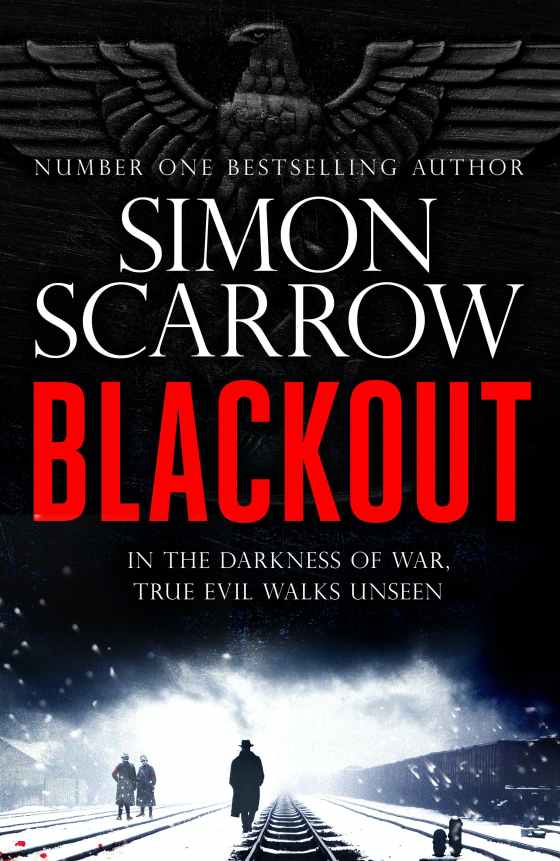
Publisher: Headline (Trade Paperback – 30 March 2021)
Series: Standalone/Book One
Length: 424 pages
My Rating: 4.5 out of 5 stars
One of the leading authors of historical fiction, Simon Scarrow, breaks new ground in a thrilling and captivating historical murder mystery, Blackout.
Berlin, December 1939. As the citizens of Berlin worry about a potential upcoming conflict with Britain and France, the Nazi party continues to sink their claws into every aspect of German society. But as a bleak winter sets in and enforced blackouts plunge the city into darkness, a far more sinister threat begins to stalk the streets of Berlin.
A young woman has been found brutally murdered near a busy set of train tracks. The victim is a former famous actress with a powerful husband. Due to her marital connections, as well as a scandalous past with various high-ranking Nazi figures, including Goebbels, her case has dangerous political implications. To that end, her case is assigned to Criminal Inspector Horst Schenke of the Kriminalpolizei, the Kripo, one of the few police officers not to join the party. Due to his apparent disregard for the party and the importance of the victim, Horst is under intense pressure from the head of the Gestapo to solve this case. However, what begins as an easy murder case swiftly devolves into something far more dangerous when a second body is found, and Horst is forced to face the reality that he is chasing a serial killer.
As the bodies of more young women are discovered, Horst rushes to find a killer before the government attempts to hush up the fact that a killer is loose within their perfect Nazi society. But with the Gestapo interfering at every step and key suspects protected by the Abwehr, German Military Intelligence, this case proves difficult to solve. When a survivor is found, Horst thinks this may be the opportunity to find the killer. However, when the witness is revealed to be Jewish, Horst is forced to find a way to protect her from both the killer and the Gestapo. Can Horst find the killer before it is too late, or will he discover that disloyalty to the Nazi government is considered a far worse crime?
This was another amazing novel from one of my absolute favourite authors. Scarrow is best known as a Roman historical fiction author due to his long-running and impressive The Eagles of the Empire series, which I am a particular fan of (see my reviews for The Blood of Rome, Traitors of Rome, and The Emperor’s Exile). However, Scarrow has also branched out into other historical periods with his Revolution quartet, the standalone novels The Sword and the Scimitar and Hearts of Stone, and a modern crime novel he wrote with his colleague Lee Francis, Playing with Death (which I really need to check out). His latest book, Blackout, is an interesting change of pace from some of the previous Scarrow novels I have enjoyed, presenting a compelling murder mystery story with the dark historical setting of Nazi Germany. Blackout, which was unfortunately delayed from last year, proved to be an excellent read, and I loved the complex and powerful story that Scarrow came up with.
Scarrow’s latest book has an outstanding narrative that starts with a Nazi social party scene quickly leading to the brutal murder. This shocking opening in the dark of a blacked-out Berlin sets the scene for the rest of Blackout perfectly, and lets the reader know that they are in for an intense and dark tale. The narrative then advances to the next day, with a great introduction to central protagonist Inspector Horst Schenke, who gets to showcase his deductive ability while also covering his personality and feelings about the Nazi government. Once the case proper begins, Horst and his team are thrust into a lethal hunt for a serial killer, while also having to contend with the vicious politics and intrigue of the Nazi party. Horst finds himself caught between the Gestapo, German Military Intelligence, and other influential Nazis, each of whom are attempting to manipulate the situation for their own ends. This blend of mystery and dangerous political intrigue makes for a fantastic read, and I enjoyed the compelling balance that Scarrow produced. The mystery itself is well crafted, with the author ensuring there is a complex and tangled web to unravel, with several promising suspects. There are some very cool twists added into the plot, and I quite enjoyed the exciting conclusion and eventual reveal of the killer. This is also a very effective standalone mystery, which would serve as a great introductory novel if Scarrow ever wanted to revisit this setting and characters in the future. A series set around this book could go in some interesting directions, and I for one would be quite keen for that.
Easily the most captivating and fascinating part of this novel is the amazing historical setting that Scarrow used as the backdrop to his amazing mystery. While several great mystery series have used World War II Germany as a setting before (the Bernie Gunther series by the late, great Philip Kerr comes to mind), I think that Blackout was a particularly good example of how it could be done, with Scarrow making sure that it really enhanced this already incredible story. Scarrow skilfully works several fantastic and intriguing elements of this iconic setting into his narrative. This includes the blacked-out winter streets and train lines of 1939 Berlin, which serve to hide the killer’s actions and ensures an easy hunting ground. I also appreciated the air of worry and uncertainty that inhabited many of the characters as they are constantly left wondering if their country is heading towards a bigger war with Britain and France, not knowing of their government’s master plan. There is also a certain amount of nationalism, patriotism and casual racism/anti-Semitism on the streets, which is a confronting and concerning aspect that the protagonist has to deal with. There is also a fascinating focus on the way in which the Nazis infested all aspects of the German government and administration, particularly the police. Inspector Horst is constantly butting heads with other members of the police force who were only promoted due to their party allegiances, rather than any skill or ability, which impacts the protagonists to successfully investigate his crime. Add in the compelling depictions of German politics and Nazi interference that I mentioned before, and you have a very impactful and distinctive setting, which really helped to turn this crime novel into something very special.
Scarrow has a knack for creating some interesting and likeable characters, and this is certainly true for Blackout. Inspector Horst is a fantastic protagonist, a former famous race car driver who experienced a traumatic crash several years ago. He has since reworked himself as a talented police investigator and a rare man of honour in troubled times. There is a lot to like about Horst, including his brilliant investigative skills, his courage in the face of danger, and his complete disregard for the Nazi leadership. As one of the few senior police officers who has not joined the Nazi party, Horst is a bit of a black sheep amongst the ranks of his organisation, especially as he barely contains his disdain for the Nazis and what they are doing to his country. This invariably leads him into a whole mess of trouble, which sees him in the crosshairs of the Gestapo and other Nazi figures, who seek to use his neutrality and skill for their own advantages. I had a lot of fun following Horst throughout this novel, and it was great to see how a non-Nazi supporter would survive amongst the authoritarian ranks of German police in this period. There are several great storylines surrounding this character, including about the trauma he is experiencing from his crash, as well as guilt at his failure to save the people closest to him. I really enjoyed this character in Blackout, and it seems likely that Scarrow would have some very compelling storylines in place for this character if he ever revisited this series.
Aside from Horst, there are several other compelling side characters in this novel, which include a mixture of fictional characters and real historical figures. One of the better characters is Ruth, the only apparent survivor of one of the serial killer’s attacks. Ruth is a feisty and combative character, made so by her position as one of the few Jewish people still remaining in Berlin. Despite being threatened by the entire German apparatus as well as a serial killer, Ruth remains strong throughout the book and is a very inspirational character to follow. I also quite enjoyed the character of Liebwitz, a Gestapo agent assigned to Horst’s unit to spy on him and report back to the Gestapo commander. However, Liebwitz proves to be a rather unusual Gestapo agent, more concerned with facts and analysis, rather than Nazi internal politics, and it was fascinating to see an honest and non-sociopathic member of the Gestapo. While there is a lot of mistrust for Liebwitz in the beginning, he soon becomes a major part of the investigation, and Scarrow sets up some very interesting storylines for him. Finally, I also quite enjoyed the killer of the story. Several sequences in Blackout are shown from his point of view, although his identity is kept hidden towards the end of the book. Scarrow paints an interesting picture of this killer’s mental state, and it was interesting to see his motivations run parallel to the goals of the Nazi party, which he uses to justify some of his actions, and indeed his actions are something that the Nazi leadership might approve of. I felt that the author did a good job setting this antagonist up throughout the novel, and I rather liked the twist surrounding their eventual reveal.
Simon Scarrow continues to show why he is one of the leading authors of historical fiction with the outstanding and captivating historical murder mystery, Blackout. Breaking into a whole new historical period and setting, Scarrow produces a fantastic and powerful murder investigation which makes amazing use of its complex characters and detailed historical setting. Featuring all manner of twists, political intrigue and devious Nazi characters, Blackout was a compelling and intriguing read that comes highly recommended. I cannot wait to get my next hit of Scarrow, and luckily I don’t have to be patient for long as the next Eagles of the Empire book, The Honour of Rome, is out in a few months time.

Pingback: Book Haul – 7 November 2021 – The Unseen Library
Pingback: The Honour of Rome by Simon Scarrow – The Unseen Library
Pingback: Waiting on Wednesday – Death to the Emperor by Simon Scarrow – The Unseen Library
Pingback: Waiting on Wednesday – Dead of Night by Simon Scarrow – The Unseen Library
Pingback: Death to the Emperor by Simon Scarrow – The Unseen Library
Pingback: Top Ten Tuesday – Books on my Summer 2022/23 TBR – The Unseen Library
Pingback: Top Ten Tuesday – Most Anticipated Books Releasing in the First Half of 2023 (Mystery, thrillers, comics and historical fiction) – The Unseen Library
Pingback: Book Haul – 2 February 2023 – The Unseen Library
Pingback: WWW Wednesday – 22 March 2023 – The Unseen Library
Pingback: WWW Wednesday – 29 March 2023 – The Unseen Library
Pingback: WWW Wednesday – 5 April 2023 – The Unseen Library
Pingback: Dead of Night by Simon Scarrow – The Unseen Library
Pingback: Top Ten Tuesday – My Favourite Books From the First Half of 2023 – The Unseen Library
Pingback: Top Ten Tuesday – Books With One-Word Titles – The Unseen Library
Pingback: Top Ten Tuesday – My Favourite Sequels of 2023 – The Unseen Library
Pingback: Rebellion by Simon Scarrow – The Unseen Library